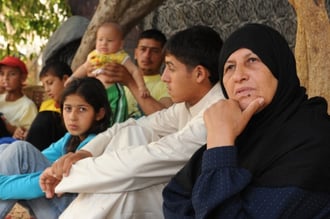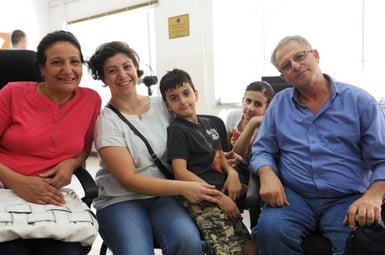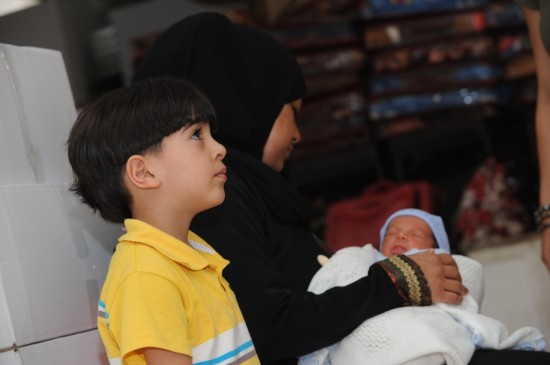Editor's note: Thanks to our friends at Catholic Relief Services for sharing this important update. To donate or to learn how you can support CRS' emergency response in this region or around the world, visit CRS.org. LMH
Humanitarian Crisis Grows for Syrian Refugees
By Caroline Brennan
They are predominantly mothers, children and grandparents, and they bear the wounds of a war they never intended to fight.
The violence in Syria has spiraled into a tumultuous, terrifying conflict and has led to paralyzing fear for innocent civilians—many of them women, children and the elderly. The United Nations estimates that nearly 170,000 Syrians had fled their homes for the safety of neighboring countries.
Through its global network of Catholic Church partners, Catholic Relief Services is supporting urgent medical care and emergency relief for tens of thousands of Syrian refugees in the areas most affected by the conflict across the region. As the crisis worsens and more Syrians are forced to flee their homes because of the violence, CRS is expanding relief efforts for the conflict’s victims.
Longing To Be Together
 Photo by Bill Lyons
Photo by Bill Lyons
The families coming into Jordan and Lebanon say they represent pieces of something that might never again be whole. Emotions in the clinics and at refugees' temporary homes run deep, along with an underlying theme of despair for the loss of life as they knew it.
For Noujad, a grandmother in her sixties, she never saw this coming.
"I am thinking throughout the night: How can it be that my husband was killed and my son was kidnapped?" she asks. "The heart of a mother is very sensitive. Nobody can feel the way a mother does…. When her son gets sick, a mother can't sleep in the night. My son is missing, and I can't sleep in the night. I want nothing but patience from God. We had no idea we would be leaving Syria this way. For my husband who left us, may he rest in peace. I hope he is in heaven now. I only ask that God protects my son."
Noujad and her extended family are receiving food; relief supplies such as stoves, soap and blankets; and regular visits by Caritas staff in their temporary home.
Syrian Refugees Find Help in Camps
Ziad Rshidat Abu-yamai, 52, is living the life of a single father, waiting for word that his wife has finally made it across the border. In her last attempt, she was turned back. Ziad is struggling with anxiety over what has become of her and his two daughters. At the same time, though, he must calm the fears of his 7-year-old son.
"I think too much of my wife and daughter," he says. "I keep thinking of what they might be doing now. Will they be kidnapped, killed or raped? My son cries for them at night. He hasn't seen his mother in 7 months."
Ziad brings his son for a counseling session at the Caritas clinic in the Jordanian border town of Mafraq. The counselor, Lana, gives the young boy crayons, which doesn't hurt, says Ziad, who tells the counselor that he's noticed a significant improvement in his son's demeanor since the weekly visits.
"I have nothing to do but remain strong, to look after my child and to keep things normal," says Ziad. "It will take time, especially for our children, to get over what they have witnessed. It won't be easy. My son always asks the same questions about who are hurting people. He is even drawing guns with his crayons. I wish fathers around the world never have to live the experience we have lived. I wish for no one to have lived this—and for them to live normally and happily with their children."
 Photo by Bill Lyons
Photo by Bill Lyons
'Things That Weren't Supposed to Happen'
Salam Zekkar, 57, is one of the lucky ones: Her entire family is with her. They are among the minority of Christian families who were living in Syria. She and her husband grew up together—"I knew at the age of 13 I wanted to marry him," she says—and they can't imagine ever being apart.
"I had two choices: to hold a gun and to fight, or to escape," said Salam's husband, Debo Issa Turk. "I had no choice."
"Our home back in Syria was very beautiful," says Salam. "We had a big bathroom and kitchen, a large salon and guestroom."
"Our living room was painted white, and the kids' room was painted brown," her husband continues. "We used to sing. I have a good voice, and we were part of the church choir."
But in July 2011, things started to change with murmurs of kidnappings. Things that weren't supposed to happen in these neighborhoods—to these towns, to these families—started to happen. And then, the unthinkable: On their walk to a bakery, some women were shot.
"We escaped in the middle of the night. God protected us," says Debo. "We came to Jordan with nothing—literally with the clothes on our backs. The most important thing is that our kids are safe. I didn't even take my last paycheck when we left. I couldn't look back."
Salam and Debo's family is like many who yearn to be back home in Syria—some refugees are counting the days. They long even more to be together, to have their loved ones safe and within reach.
"We stare in front of two emotions now," says Debo. "Emotionally, we want to be back home in Syria by Christmas. Logically, we know that it is impossible to go back now. We know that we are lucky to just be with each other—to have each other. Our family is everything."
 Photo by Bill Lyons
Photo by Bill Lyons
The Catholic Relief Services Response
In close coordination with our long-term partners, Caritas Jordan and Caritas Lebanon, Catholic Relief Services is providing people with:
- Food: CRS is supplying vegetable cooking oil, beans, rice, lentils and sugar to refugees.
- Medical care: Refugees benefit from high-quality medical and dental care at eight clinics across Jordan. Services include counseling for survivors (especially children) of trauma. Because a number of refugees suffered wounds during the violence, and many lack access to medical care, the need for these services is significant.
- Hygiene and sanitation: CRS is distributing soap, sanitary napkins, buckets and other materials to help prevent crises, such as waterborne diseases. Teams of CRS staff members and volunteers are teaching survivors about hygiene practices, such as hand-washing, safe waste disposal and ways to keep water clean.
- Emergency household supplies: CRS is providing prepackaged relief kits of bedding, kitchen sets, fans and other essential living supplies to arriving refugees.
To donate or to learn how you can support CRS' emergency response in this region or around the world, visit CRS.org.
Caroline Brennan is a CRS senior communications officer.
Photos by Bill Lyons for Catholic Relief Services. Photo, when used by the media, can only be used when accompanying a story about Catholic Relief Services. Photos can not be used for any other purpose apart from a story about Catholic Relief Services.
About the Author

Guest
We welcome guest contributors who graciously volunteer their writing for our readers. Please support our guest writers by visiting their sites, purchasing their work, and leaving comments to thank them for sharing their gifts here on CatholicMom.com. To inquire about serving as a guest contributor, contact editor@CatholicMom.com.


.png?width=1806&height=731&name=CatholicMom_hcfm_logo1_pos_871c_2728c%20(002).png)
Comments